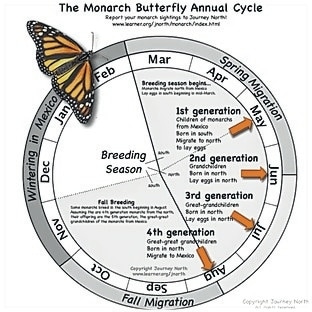
COLUMBUS – With the drastic decline in the population of the monarch butterfly, the Ohio Pollinator Habitat Initiative is asking the public for help in creating habitats by collecting milkweed seed pods from established plants Sept.1 through Oct. 30 and dropping them off at collection stations around the state. The seeds will be used to establish new plantings for the monarch butterfly throughout Ohio in the coming years.
“Common milkweed is essential to the survival of monarch butterflies in Ohio,” said Marci Lininger, biologist with the U.S. Fish and Wildlife Service. “Ohio is a priority area for monarchs. Fourth generation monarch butterflies hatch in Ohio in late summer, migrate north to Canada and then come back through Ohio once more in order to fly to Mexico for the winter. This same generation is also responsible for starting the life cycle all over again in the spring, laying the following year’s first generation of monarchs.”
“Most Ohio counties have a Milkweed Pod Collection Station, most of them being located at local Soil and Water Conservation District (SWCD) offices,” said Lori Stevenson, Ohio Private Lands State Coordinator with the U.S. Fish and Wildlife Service.
Local Soil and Water offices
The Soil and Water Conservation District office in Champaign County is located in Suite E-100 of the county Community Center, 1512 S. U.S. Route 68 in Urbana. For info, call the office at 937-484-5527.
The Soil and Water Conservation District office in Logan County is located at 324 county Road 11 in Bellefontaine. For info, call the office at 937-593-2946.
How to collect
To collect the seed pods from the suggested milkweed plants, it is best to pick them when they are dry, gray or brown. If the center seam pops with gentle pressure, they can be picked. It is best to collect pods and store them in paper bags or paper grocery sacks. Avoid using plastic bags because they attract moisture. Store pods in a cool, dry area until they can be delivered to the closest Milkweed Pod Collection Station. Harvesting pods from milkweed plants does not have any effect on the population of milkweed in established areas.
When collecting milkweed pods wear appropriate clothing for the outdoors. It is recommended that collectors wear disposable gloves when picking and handling pods. Always ask permission when collecting pods on anyone’s property.
“ODOT is one of the largest landholders in Ohio, with more than 19,000 miles of right of way,” said ODOT Director Jerry Wray. “Planting milkweed and other native wildflowers on our roadsides benefits pollinators who in turn benefit agriculture. They also beautify our highways and reduce mowing costs, a double bonus for Ohio taxpayers.”
This project was formed in response to the 2014 petition to list the monarch butterfly as federally endangered. Its partners include the Ohio agencies, universities, corporations and non-profit organizations.
The project informs citizens, landowners, farmers and government agencies of the importance of pollinators and the habitat they need to survive. Members of the initiative provide education, outreach and technical assistance to all that have an interest in pollinators and protecting our food supply.
For more information or questions concerning pollinators, contact OPHI at 614-416-8993 or contact the local SWCD office.


